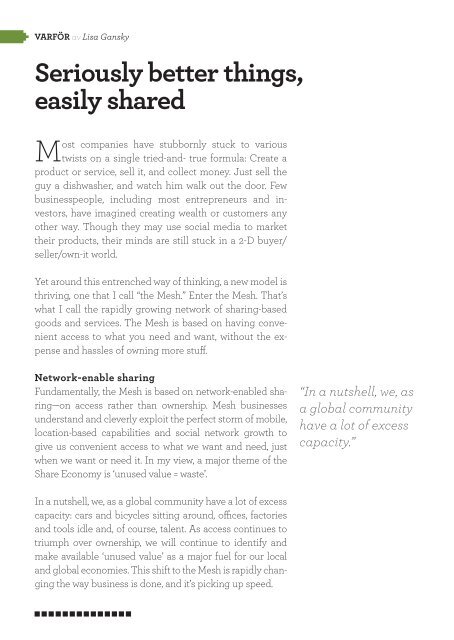här - Media Evolution
här - Media Evolution
här - Media Evolution
You also want an ePaper? Increase the reach of your titles
YUMPU automatically turns print PDFs into web optimized ePapers that Google loves.
VARFÖR av Lisa Gansky<br />
Seriously better things,<br />
easily shared<br />
ost companies have stubbornly stuck to various<br />
Mtwists on a single tried-and- true formula: Create a<br />
product or service, sell it, and collect money. Just sell the<br />
guy a dishwasher, and watch him walk out the door. Few<br />
businesspeople, including most entrepreneurs and investors,<br />
have imagined creating wealth or customers any<br />
other way. Though they may use social media to market<br />
their products, their minds are still stuck in a 2-D buyer/<br />
seller/own-it world.<br />
Yet around this entrenched way of thinking, a new model is<br />
thriving, one that I call “the Mesh.” Enter the Mesh. That’s<br />
what I call the rapidly growing network of sharing-based<br />
goods and services. The Mesh is based on having convenient<br />
access to what you need and want, without the expense<br />
and hassles of owning more stuff.<br />
Network-enable sharing<br />
Fundamentally, the Mesh is based on network-enabled sharing—on<br />
access rather than ownership. Mesh businesses<br />
understand and cleverly exploit the perfect storm of mobile,<br />
location-based capabilities and social network growth to<br />
give us convenient access to what we want and need, just<br />
when we want or need it. In my view, a major theme of the<br />
Share Economy is ‘unused value = waste’.<br />
In a nutshell, we, as a global community have a lot of excess<br />
capacity: cars and bicycles sitting around, offices, factories<br />
and tools idle and, of course, talent. As access continues to<br />
triumph over ownership, we will continue to identify and<br />
make available ‘unused value’ as a major fuel for our local<br />
and global economies. This shift to the Mesh is rapidly changing<br />
the way business is done, and it’s picking up speed.<br />
“In a nutshell, we, as<br />
a global community<br />
have a lot of excess<br />
capacity.”<br />
Why is the Mesh growing so fast?<br />
There are a few significant reasons: population growth, the<br />
recession and that we are living in a time when anyone,<br />
almost anywhere, can reach a person, company or market<br />
faster, with far less capital required.<br />
We now have an enhanced ability not only to leverage existing<br />
platforms, but also to refine and test our offering more<br />
quickly and inexpensively than ever before through social<br />
media networks, popup shops and galleries and apps.<br />
Some of these Mesh businesses are international enterprises<br />
(Like ZipCar.com and LoveFilm.com). These services<br />
own the inventory of products or facility which they then<br />
make available to their customers via a ‘share’ or membership<br />
model. Many other Mesh companies are two sided<br />
marketplaces which are peer-to-peer or community based.<br />
In other words, marketplaces which allow us to borrow,<br />
swap and rent things from one another. These businesses<br />
take advantage of local peer-to-peer (P2P) platforms like<br />
Facebook and Foursquare, which make it easy to be connected<br />
while mobile.<br />
There are now over 6,500 share-based companies in the<br />
Mesh community directory at Meshing.it. The competitive<br />
advantages for Mesh companies are so enormous that<br />
the new model has become the major driver for businesses<br />
old and new.<br />
Lisa Gansky is the author of The Mesh - Why the Future of Business<br />
is Sharing<br />
“There are now over<br />
6,500 share-based<br />
companies”








